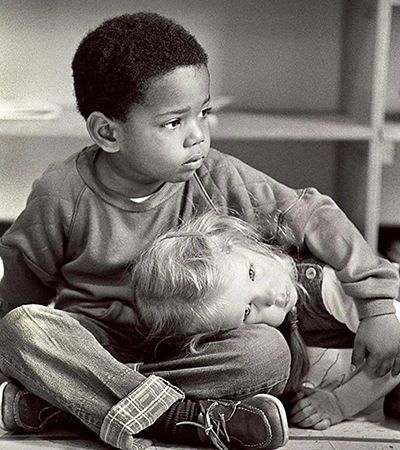Books
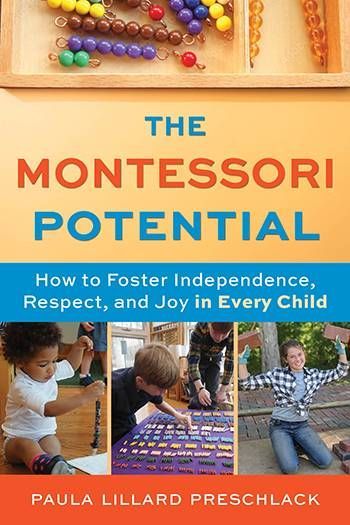
Our former Head of School Paula Lillard Preschlack says with a laugh that her older sister Lynn Lillard Jessen convinced her to begin her Montessori journey by enticing her with bowls of ice cream and asking her, “What else are you going to do?!” More than twenty-five years later, we can all be grateful that Paula didn’t choose something else to do! Paula spent almost three decades taking three Montessori trainings, teaching at the Primary and Elementary age level, leading Forest Bluff School as a Head of School, raising her own two children in a Montessori home, working with parents, reading countless books on development and Maria Montessori, and continuing her own education through conferences and conversation with other educational, developmental, and Montessori experts. She also continued to write and give talks in order to share this information, as well as her knowledge and observations, with this special community. After twenty-five years at Forest Bluff, Paula has moved to the next chapter of her life, writing a book on what she learned about Montessori in action. On February 7, her book “The Montessori Potential: How to Foster Independence, Respect, and Joy in Every Child” will be released to the public! This book is a culmination of her work so far, not only sharing the theory of Montessori, but offering lively anecdotes and engaging conversation that bring the theory to life. Her book serves as more than just an explanation of the Montessori curriculum. In it, she describes how it actually works, with examples from real classrooms, and what triumphs and struggles schools face every day as they implement this approach. Her insights into Montessori’s practical application are invaluable. It is a call to action for parents, teachers, administrators, policy makers, and all interested community members. Paula shares, “This book is for educators, reformers, concerned citizens, and parents, who want to learn how to recognize authentic Montessori education and to learn how—exactly—the approach works so well for children.” Paula’s book walks the reader through the essentials of the Montessori framework, what an ideal Montessori school looks like, why authentic Montessori matters and what challenges it faces, how Montessori is integrated into public schools, and what Montessori looks like for parents at home. Her entertaining stories about real life students and teachers make these important points accessible and memorable. Order Paula’s book anywhere where you buy books, and join her for a virtual book launch on February 7 and for a book signing at Gorton Community Center with Lake Forest Book Store in Lake Forest, IL, on April 28 from 5-7pm. Check her website for virtual and in-person speaking events across the country this year, or contact her to speak at your school or community! Paula’s book plays an important role in bringing the potential of a Montessori education to the greater world. Nora Flood, the Education Lead at Wend Collective, writes, “This is the most comprehensive book I have read that illustrates the history of, framework for, and power of the Montessori approach. Preschlack’s writing has helped me understand, and in turn articulate, why every child deserves a Montessori education!” Michael G. Thompson, coauthor of Raising Cain and The Pressured Child , writes, "In her passionate and beautifully written new book, Paula Lillard Preschlack explores not only the potential of the Montessori approach but also the potential of children to grow into fully engaged and joyous learners. In a time when we see children as fragile and in constant need of our anxious supervision, Preschlack sees them as independent, adaptable, and resilient. Educators and parents and politicians need to read The Montessori Potential to remind themselves of what children can do if we create learning environments for them that unlock their strengths." Links Order your book from The Lake Forest Book Store or Amazon Virtual book launch Gorton book event (sign up for her newsletter for a free invitation) Interview with Julia Volkman of Maitri Learning Paula’s website Paula’s Soundcloud site for a variety of talks Newsletter for educators
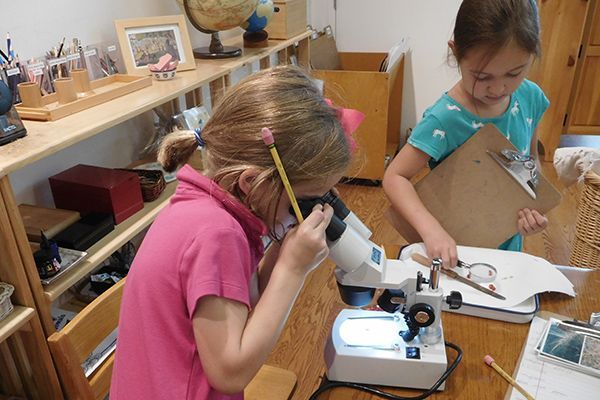
I love finding ways that Montessori’s educational approach inherently addresses human needs. When I look at books espousing the best ways to teach, the best ways to conduct business, or the best ways to be healthy, I usually find that the Montessori approach already incorporates the recommended practices—and always in an integrated, natural way. The Forest Bluff Directors and I are witnessing this once again while reading our latest teacher group discussion book at Forest Bluff, The Innovator’s DNA: Mastering The Five Skills of Disruptive Innovators, by Jeff Dyer, Hal Gregersen, Clayton M. Christensen. In today’s world, the ability to innovate is key to solving problems large and small. I would argue that it has always been important for human survival and progress, but it has become a more urgent need, and now it’s a buzzword for educators. The aforementioned authors explain that to create something new—to innovate—a person needs to associate (connect ideas), network with others (socialize), observe (reflect), question (lead with your curiosity), and experiment (be unafraid to try things and fail). In the Montessori approach, you can see how these practices, or habits, are all actively encouraged and cultivated. Each of these important aspects of innovating are worked into the educational approach seamlessly. Dr. Montessori was simply following what made sense for optimal human development. For one example, Montessori education has captured an essential key to children’s learning: presenting the world in context, from the whole to the parts, with a deliberate, ongoing opportunity for children to associate topics, themes, and details of information. Associating is a crucial skill. Montessori’s approach creates habits in children’s thinking that prepare them for a life of innovative creativity and problem solving by constantly encouraging them to associate.
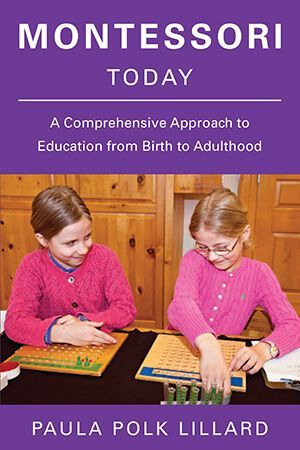
More than a century after Dr. Maria Montessori developed a pedagogy based on her scientific observations of children, Montessori education is still considered a revolutionary approach, with its multi-age classrooms, self-directed learning, specially prepared environments, and sensorial materials. Perhaps the most revolutionary thing about Montessori education is its end goal: to allow for the optimal development—intellectual, physical, social, and emotional—of the whole child. This ambitious aim was the driving force behind Dr. Montessori’s life’s work, and a growing body of educational research now supports much of what she knew to be true through her own observations: Children thrive in academic and non-academic ways when given freedom and responsibilities in an environment that has been prepared according to their developmental needs. While studies have shown Montessori students to outperform their non-Montessori counterparts on measures of academic skills, social skills, creativity, and executive function, the research on Montessori suggests that its effectiveness is largely dependent on the fidelity of implementation. At a time when t he demand for Montessori education is growing , it is helpful to have resources that allow parents and educators to better understand what an authentic Montessori education looks like. One such resource is Paula Polk Lillard’s book Montessori Today: A Comprehensive Approach to Education from Birth to Adulthood , which provides readers with a glimpse inside authentic Montessori classrooms and explains the philosophy, principles, and rationale of the approach. Covering topics such as the role of the Montessori teacher, the classroom environment, the Planes of Development, and the Great Lessons, Lillard bridges the theoretical underpinnings of the approach with its practical implementation across ages. For parents and educators who seek to engage in deeper conversation and/or thought about the topics presented in Montessori Today, there is now a Discussion Guide to accompany the book. The guide uses quotes from the text and thought-provoking questions to encourage readers to examine their own educational experiences and beliefs about child development and education. By inviting readers to relate to the Montessori approach from a personal standpoint, the guide provides an accessible way for readers to think about and discuss the foundational tenets and core characteristics of an education designed to meet the needs of the whole child. We encourage parents and educators to download the Montessori Today Discussion Guide and use it for individual reflection as well as small group discussion. Whether you are an educator looking to engage parents in meaningful discussion about Montessori education, a student considering a career in Montessori education, or a parent exploring Montessori for your child, the Discussion Guide can serve as a useful tool for reflection.
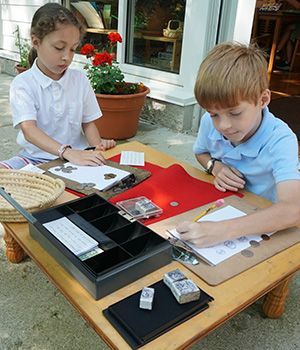
A Tough Topic for Many, an Essential Topic for All Money can be a topic wrought with emotion and social confusion. Children pick up on the ambiguity, the uncertainty, and the power of this mysterious subject—one that they encounter, in some way or another, almost daily. How do parents introduce them to this aspect of their adult lives? How do parents explain the complex feelings they themselves may have about the subject? Talking to children about money—something that for an adult might involve feelings of shame, insecurity, or maybe even resentment—can be challenging. Parents can try to stay on a surface level in conversations, but children pick up on the emotions and judgment that lie just beneath that surface. Wherever they consider themselves to be on the financial security/success scale, parents can’t get away with being vague for too long.
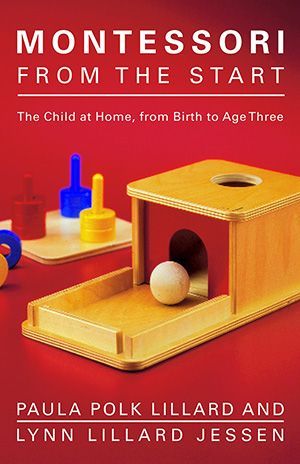
Education Begins at Birth Dr. Maria Montessori, a trained physician who specialized in pediatrics and psychiatry before establishing her own educational philosophy and approach, recognized that tremendous brain, motor, and personality development occur during the first three years of a child’s life. These observations, once considered revolutionary, are now widely accepted among early childhood professionals and researchers. Given her understanding of the earliest years of human development—in which the child, from the moment he is born, uses all his senses for the important work of constructing his own personality and intellect—Montessori believed that education begins at birth. Accordingly, she emphasized the importance of preparing the home environment and caring for the youngest of children in a way that supports their intrinsic drive to learn and need for independence. Montessori from the Start

